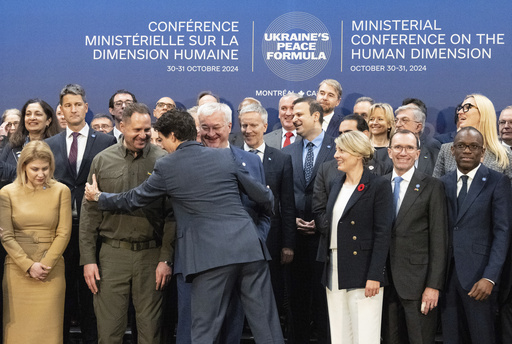
MONTREAL — On Thursday, more than 45 countries united in Montreal to commit to the repatriation of Ukrainian civilians, prisoners of war, and children who have been taken by Russia since the onset of its invasion.
Canadian Foreign Affairs Minister Mélanie Joly announced that these nations agreed to collaborate in gathering information regarding Ukrainians detained in Russia and to establish secure pathways for their return.
“The protection of human lives is paramount. Children, civilians, and prisoners of war should have the opportunity to return to their homes,” she stated during a press briefing wrapping up a two-day summit focused on the humanitarian aspects of the conflict.
Ukrainian Foreign Affairs Minister Andrii Sybiha highlighted the severity of the situation, indicating that almost 42,000 Ukrainians are unaccounted for, including nearly 20,000 children that have been deported to Russia. Currently, only 860 Ukrainian children have successfully returned home.
Joly emphasized that the joint declaration signed on Thursday aims to enhance existing endeavors to track down missing Ukrainians. She mentioned that nations like Qatar, South Africa, and the Holy See have volunteered to act as intermediaries in negotiating the return of civilians, prisoners of war, and children. Additionally, Lithuania and Qatar will serve as transit points for the Ukrainians who are released.
While officials did not disclose the names of the over 70 countries that sent representatives to Montreal, it remained unclear which specific nations had endorsed the pledge by Thursday evening. Notably, key countries such as China, India, and Brazil did not participate, though both Mexico and South Africa were present at the conference.
Joly pointed out that numerous nations experienced “direct pressure from Russia” to abstain from attending the summit. “Russia exerted significant influence in various capitals around the world, advising them against coming to Montreal,” she remarked. “This indicates that our actions are illuminating an issue that puts Russia in a difficult position.”
The International Criminal Court had previously issued arrest warrants for Russian President Vladimir Putin and his children’s rights commissioner, Maria Lvova-Belova, accusing them of war crimes related to the unlawful deportation and transfer of children from occupied regions of Ukraine to Russia. The Kremlin has dismissed these allegations.
